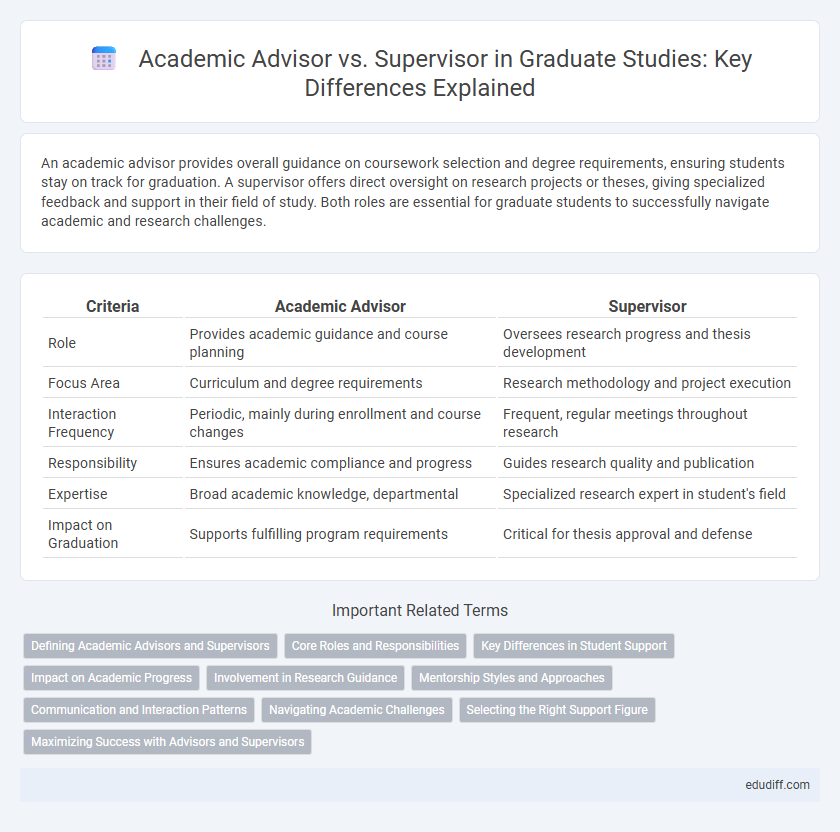An academic advisor provides overall guidance on coursework selection and degree requirements, ensuring students stay on track for graduation. A supervisor offers direct oversight on research projects or theses, giving specialized feedback and support in their field of study. Both roles are essential for graduate students to successfully navigate academic and research challenges.
Table of Comparison
| Criteria | Academic Advisor | Supervisor |
|---|---|---|
| Role | Provides academic guidance and course planning | Oversees research progress and thesis development |
| Focus Area | Curriculum and degree requirements | Research methodology and project execution |
| Interaction Frequency | Periodic, mainly during enrollment and course changes | Frequent, regular meetings throughout research |
| Responsibility | Ensures academic compliance and progress | Guides research quality and publication |
| Expertise | Broad academic knowledge, departmental | Specialized research expert in student's field |
| Impact on Graduation | Supports fulfilling program requirements | Critical for thesis approval and defense |
Defining Academic Advisors and Supervisors
Academic advisors guide graduate students through program requirements, course selection, and academic policies to ensure timely progress toward degree completion. Supervisors oversee the research component, providing expertise, feedback, and direction on thesis or dissertation projects. Both roles are essential for academic success, with advisors focusing on administrative support and supervisors on scholarly mentorship.
Core Roles and Responsibilities
Academic advisors guide graduate students through course selection, degree requirements, and career planning to ensure academic success and timely program completion. Supervisors focus on mentoring students in research design, methodology, data analysis, and scholarly writing to support thesis or dissertation development. Both roles are essential for comprehensive graduate education, balancing administrative support with specialized academic mentorship.
Key Differences in Student Support
Academic advisors provide broad guidance on course selection, degree requirements, and career planning to support overall student success. Supervisors focus specifically on research direction, project management, and skill development within the student's academic discipline. The key difference lies in advisors addressing general academic progress, while supervisors offer specialized mentorship tailored to the student's thesis or research work.
Impact on Academic Progress
Academic advisors provide essential guidance on course selection and program requirements, ensuring students meet graduation criteria efficiently. Supervisors offer specialized support and mentorship in research projects, directly influencing the quality and direction of academic work. Both roles significantly impact academic progress by facilitating structured learning and fostering scholarly development.
Involvement in Research Guidance
Academic advisors typically provide broad guidance on course selection and degree requirements, while supervisors play a more direct role in research guidance, offering detailed support on thesis development and experimental design. Supervisors engage closely with graduate students throughout the research process, ensuring methodological rigor and academic integrity. The involvement of supervisors is crucial for navigating challenges in data analysis and publication strategies.
Mentorship Styles and Approaches
Academic advisors typically provide structured guidance focusing on course selection, degree requirements, and academic policies, prioritizing a broad administrative mentorship approach. Supervisors, in contrast, engage in close mentorship centered on research development, professional skill-building, and individualized feedback within a specific project or thesis context. Understanding these distinct mentorship styles helps graduate students optimize support by aligning their needs with the appropriate advisor or supervisor role.
Communication and Interaction Patterns
Academic advisors typically engage in ongoing, holistic communication focused on academic planning and career development, fostering regular check-ins and proactive guidance. Supervisors maintain more specialized, project-centered interactions with graduate students, emphasizing detailed feedback and research progress discussions. Effective communication in both roles relies on clarity, responsiveness, and tailored support to meet the unique academic and professional needs of graduate students.
Navigating Academic Challenges
Academic advisors provide broad guidance on course selection, degree requirements, and career planning, helping graduate students navigate institutional policies and academic challenges effectively. Supervisors offer specialized support by overseeing research projects, providing expert feedback, and fostering professional development within the student's field of study. Understanding the distinct roles ensures targeted assistance, promoting academic success and timely program completion.
Selecting the Right Support Figure
Choosing the right support figure in graduate studies hinges on understanding the distinct roles of academic advisors and supervisors. Academic advisors guide course selection, program requirements, and career development, while supervisors focus on research direction, project execution, and thesis guidance. Selecting a compatible advisor and supervisor aligned with your academic goals and communication style maximizes graduate success and professional growth.
Maximizing Success with Advisors and Supervisors
Maximizing success in graduate studies requires understanding the distinct roles of academic advisors and supervisors, where advisors guide course selection and career planning, while supervisors oversee research progress and thesis development. Establishing clear communication and setting mutual expectations with both helps optimize academic performance and timely graduation. Leveraging the expertise and feedback from advisors and supervisors enhances skill development and opens opportunities for networking and professional growth.
Academic Advisor vs Supervisor Infographic

 edudiff.com
edudiff.com